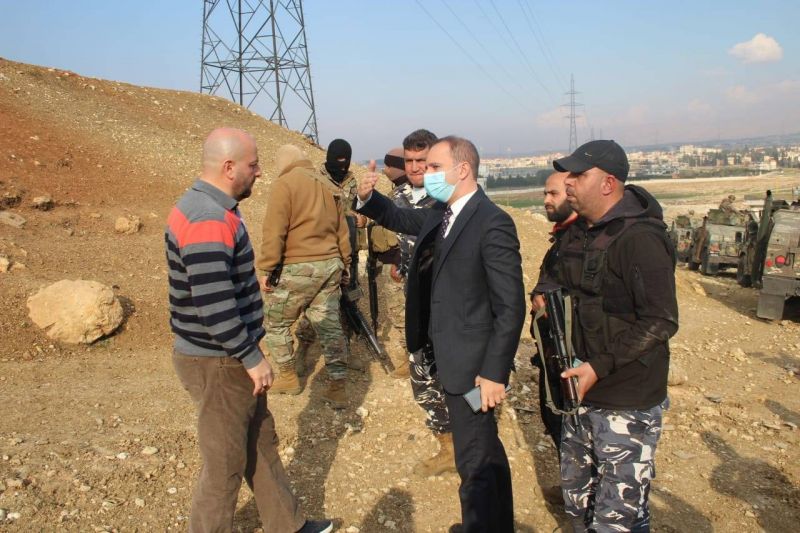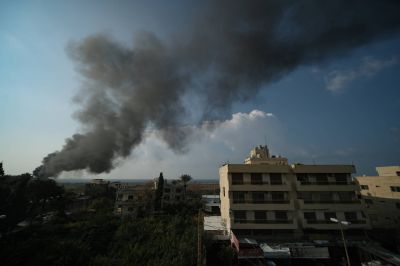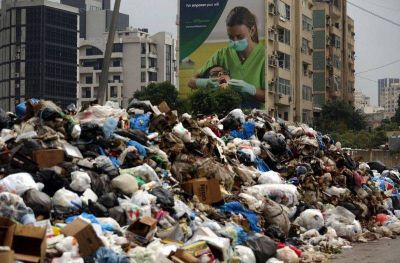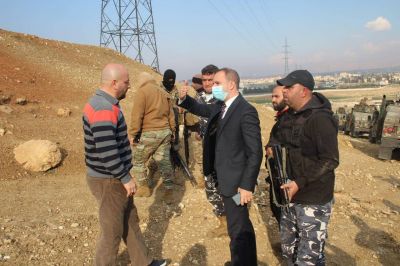
The mohafez of Baalbek-Hermel, Bachir Khodr, accompanied by security forces to close the illegal Kayyal in Baalbeck on Jan. 24, 2023. (Courtesy of Bachir Khodr)
In an old Roman quarry, a few steps from the Bekaa Valley's famous Baalbek temple, the unauthorized Kayyal landfill was officially closed last week.
First used as a dumping site during the Lebanese Civil War and described for its harmful effects on the health of residents and the environment, Kayyal was finally closed following an intervention from the Baalbek-Hermel mohafez, Bachir Khodr.
On Jan. 24, Khodr was escorted by military and security officers to confront the landfill's manager, Wissam Jaafar, a member of the Jaafar clan—one of the most influential families in the area.
This is a common situation that speaks volumes about the state's disintegration and highlights Lebanon's chaotic management of household waste.
The Kayyal landfill has been temporarily closed many times over the years but continued to operate despite the 2021 construction of two standard landfills in Baalbeck and the 2020 opening of a waste treatment plant.
The landfill has not only been completely uncontrolled but it is also located on an archaeological site—a Roman quarry from which stones were extracted to carve some of the statues at the Baalbeck temple.
For years, the garbage that was transferred to Kayyal was covered with sand or burned in the open, without first being sorted
The mohafez sent letters to the municipality of Baalbeck in 2019 and 2022, demanding the imminent closure of the landfill. In the letters, Khodr denounced “the smoke and odors that affect the health of the inhabitants and can be smelled in the vicinity of the temple.”
He also noted the presence of Roman archaeological artifacts inside the landfill site that “need to be examined and taken care of.”
“I have ordered the closure of the site more than once, but some people were benefiting from it and opposed my decision,” Khodr told L’Orient-Le Jour.
“We were forced to resort to the army to close the dump. The municipality did not respond to our requests, while the area's inhabitants were complaining about it all the time,” he added.
Garden transformation?
“The Kayyal dump has been definitively closed,” said Mustapha Chall, vice-president of the Baalbeck municipality. “It was useful until the creation of the sorting plant in 2020, then the two controlled landfills in the area. Today, it is no longer useful.”
According to Chall, the authorized landfills have the capacity to remain functional for the next ten years, while the sorting plant can handle up to 150 tons of garbage per day.
“People who benefited from [Kayyal] were paid by the municipalities in the area to bury their garbage there,” said Chall, explaining why the landfill persisted for as long as it did. However, he refused to name names.
L'Orient-Le Jour contacted Wissam Jaafar, the landfill manager, by phone, but he denied any connection to the case.
According to a well-informed source who spoke on condition of anonymity, Jaafar is feared by some of the area's residents. Even the municipality avoids confrontations with him, the same source said.
Although the dump is now closed for the time being, the issue of household waste management remains unresolved.
“The Baalbeck-Hermel area has dozens of illegal dumps. Because of the crisis, many municipalities can no longer afford to send their waste to the sorting plant and resort to these illegal dumps,” Khodr explained, adding that the area is in need of “better management and more investment.”
“As for the Kayyal dump, it could be redeveloped into a garden,” said Chall. “An Italian company had proposed to rehabilitate the site and plant trees.”
The possibility of conducting archaeological excavations on the site has not yet been seriously considered.
This article was originally published in French in L'Orient-Le Jour. Translation by Sahar Ghoussoub.


